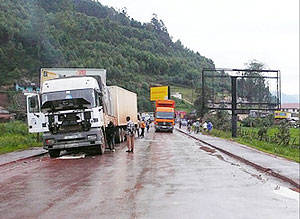There is a hard-hitting, best selling book authored by the talented Michela Wrong, about the state corruption in Kenya titled, “Its Our Turn to Eat.” After the ill-fated presidential elections in 2007, Kenya erupted into tribal mayhem that many on the outside could never have predicted.


There is a hard-hitting, best selling book authored by the talented Michela Wrong, about the state corruption in Kenya titled, "Its Our Turn to Eat.” After the ill-fated presidential elections in 2007, Kenya erupted into tribal mayhem that many on the outside could never have predicted.
The corruption in Kenya, institutionalised since the Kenyatta era is what best explains the country’s 2007 post election violence according its former anti-corruption tsar, John Githongo. Githongo is the one who blew the lid on the multi-million dollar Anglo Leasing scandal.
In Kenya, the stakes in the political game were raised so high by the corruption epidemic that a presidential election actually meant much more than just state power for an individual, or party but a chance for whole communities to get a seat at the dinning table.
Eventually, PM Raila Odinga and his ODM party found out the hard way that their chance to ‘eat’ was not to materialise, thanks to the massive rigging during the election. And that is how Kibaki joined the dirty list of African leaders who are said to ‘have lost an election but not their job’ just like Comrade Robert Mugabe of Zimbabwe and lately Laurent Gbagbo of Cote d’Ivoire.
In all cases, the plot always involves ignoring the set rules and denying the legitimate winner a chance to ‘eat’. Now Rwanda and Burundi may have to learn this lesson the hard way. In July 2007, the two joined the East African Community which previously consisted of Uganda, Kenya and Tanzania.
Although the two countries were admitted as equal partners, it has slowly emerged that the original three EAC members, are trying to play patronising games by showing unwillingness to recognise Rwanda and Burundi as equal partners in the community.
The issue of who should take up the soon-to-be vacant position of Secretary General of the East African Community has become a bone of contention for the EAC that is still trying to find its feet. According to the rules of the game (EAC statute), the position is held on a rotational basis and will fall vacant in April 2011.
The position has already been occupied by Tanzania’s Juma Mwapachu, while Kenya’s Francis Muthaura and Uganda’s Amanya Mushega held the post before the senior Tanzanian diplomat. Therefore, it is obviously time for either Rwanda or Burundi to take charge of the post.
The media has on various occasions hinted on the reluctance of Uganda, Kenya and Tanzania letting Rwanda or Burundi, take up the post in Arusha apparently because they are considered not very conversant with the intricate operations of the bloc.
For good measure Rwanda came out clearly when these speculations first surfaced. The Minister of EAC affairs, Monique Mukaruliza was steadfast in expressing Rwanda’s readiness to occupy the post. The president himself also recently joined this legitimate chorus.
Speaking to the media recently, he dismissed the claims that there was a dispute over the occupation of the Arusha post pointing out that the rules were very clear on this and he expected them to be followed. "I do not think this (rotational process) is going to change. My expectation is that the rules will be followed, and to my knowledge it is the turn of Rwanda or Burundi,” he said.
There is clearly no legitimate reason why Rwanda or Burundi should be denied a chance to hold this post. The shallow arguments that the two countries are not mature for the post are simply that. Shallow. If all the other three countries have occupied the post and have not in anyway prepared for Rwanda or Burundi to hold the post then they should take the blame.
Is it not ironical that Kenya’s Premier, Raila Odinga is occasionally flying between Nairobi and Abidjan to resolve the Ivorian electoral impasse, yet his country and its biggest neighbours seem reluctant to let Rwanda or Burundi have their turn at the helm of the regional body?
In all fairness, Rwanda and Burundi have done a lot to conform to the standards of the EAC. Rwanda opened its border to the region’s skilled labour, adopted English language and is making efforts to harmonise the education system with the rest of the countries in the bloc. The budget reading process has also been harmonised by the two countries and so much more.
The so called big brothers of the EAC should not risk the harmony of the bloc by playing double standards when it comes to letting go of the Arusha top post. It is a little disrespectful for one to assume that Rwanda and Burundi cannot produce a single competent person to lead the East African Community secretariat.
Let us not lay the ground for another Michela Wrong book by denying Rwanda and Burundi their turn to, well, ‘eat’!


